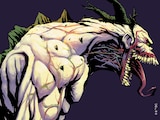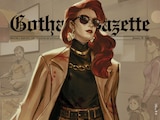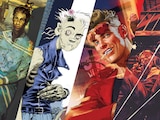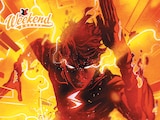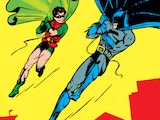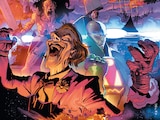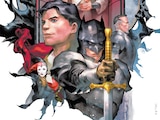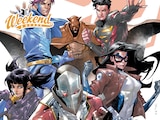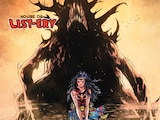Everybody is saying that Matt Reeves’ The Batman doesn’t show the Wayne murders. After countless shots of falling pearls and smoking guns set against the backdrop of a dimly lit alley in Gotham, it would seem to be a refreshing change. The problem is that it’s not true. Robert Pattinson’s Bruce Wayne does see his parents die—it’s just not in the way audiences are expecting.
When the Riddler releases his video on Thomas and Martha Wayne, Bruce’s worldview is completely shattered. In essence, he’s watching a character assassination on his parents. He’s not an eight-year-old boy standing in Crime Alley, but he’s still watching his parents get destroyed before his eyes.

The Riddler’s video suggests that Martha Wayne has a history of mental illness, and Thomas sent the mob to kill a reporter who tried to expose it. If the revelations about Thomas and Martha make you uncomfortable, it’s because they’re supposed to. Like Bruce, most of us have put the Waynes on a pedestal. For years, we’ve only seen them through Bruce’s eyes during flashbacks. Since Bruce lost his parents at such a young age, the memories he’s preserved have been the complimentary ones. When Alfred reminisces about his former employers and friends, he speaks of the good times, not of their character flaws. Thomas Wayne is always understanding and virtuous, while Martha is patient, kind and all things maternal.
We saw a wise and understanding Thomas Wayne in Batman Begins, and Martha Wayne was portrayed as an angelic spiritual guide in “Whatever Happened to the Caped Crusader.” We are meant to believe they had the perfect marriage and were ideal parents. That helps emphasize how tragic their death is in the overall Batman narrative. I previously wrote about how Bruce never got to know his parents since he was so young when they died. When you’re eight-years-old you might be close with your parents, but you don’t know their hopes, dreams and struggles, and you don’t see all their flaws.
In recent years, we’ve gotten a deeper look at Thomas and Martha across the multiverse, allowing us to see them as people outside of Bruce’s rose-tinted memories. Batman: Damned showed us that their marriage was far from perfect, while the Pennyworth television series presents them as an imperfect couple who can’t stop bickering. It shouldn’t be controversial to say that Thomas and Martha are people with flaws, yet the idea feels wrong to us because it feels wrong for Bruce.

The Riddler’s video shatters Bruce’s entire worldview. Although the movie doesn’t directly say it, I think it’s fair to assume his parents are a big part of why he chose to be Batman. Has everything that he’s done been built on a lie? Bruce realizes that he never truly knew his parents, and the revelation isn’t an easy one. Look at Robert Pattinson when he goes to see Falcone at the Iceberg Lounge. His face is full of desperation, confusion and vulnerability. And consider that Bruce is going to Falcone for answers. How desperate must he be?
The revelations about his parents weigh on Bruce’s mind, to the point where it’s all he could think about. When Alfred wakes up from his coma, Bruce doesn’t even wait before bringing it up to him. It might seem rude, but Bruce is desperate for answers, so much so that he forgets to ask Alfred how he’s feeling. That’s how much this revelation has rocked his world. Thankfully, Alfred was able to soften the blow. As Alfred makes clear, Thomas Wayne did not intend for Falcone to kill the reporter, only scare him. His father may have made morally questionable decisions, but he wasn’t a killer.

Still, while Alfred’s answers might have helped, they don’t change the bottom line. Martha Wayne still has a history of being institutionalized, and Thomas Wayne still went to the mob to scare off a reporter—even if he didn’t want it to end in murder. Bruce still has to deal with those revelations and carry them with him for the rest of his life. He may not have fully known his parents as a child, but thanks to the Riddler, he now knows them as an adult. In a twisted way, this is the biggest hit the Riddler gave to Batman, and he doesn’t even know it.
Throughout the movie, Batman is drawn to Mayor Don Mitchell, Jr.’s unnamed son. The obvious reason is that Batman sees himself in the young boy. Like Bruce, the Mitchell child also has to cope with having his father murdered before he could come of age—and finding the body to boot. It didn’t occur to me until I saw The Batman a third time that like Bruce, the Mitchell child also had to deal with the fallout of Riddler exposing his father. After Mayor Mitchell is killed, Riddler exposes him as a corrupt politician who makes deals with criminals and cheats on his wife.
How did the Mitchell child deal with these revelations? We saw how much they rocked Bruce’s world, and he’s a full-grown adult. It’s interesting to imagine that while Bruce is visiting Carmine Falcone and trying to find answers, somewhere across Gotham, the young Mitchell kid is dealing with the same problem in his own way.

When The Batman movie was first announced, I remember hearing lots of jokes about how it was time to watch the Waynes get gunned down in an alley again. Putting the morbidity of that notion aside, this movie subverted those expectations by forgoing a Crime Alley flashback. Instead, it gave us a new twist on the story beat. We’ve seen Bruce Wayne watch his parents die as a child and the trauma it gave him. Now we’ve seen Bruce Wayne watch his parents destroyed as an adult—and it traumatized him all over again. Batman has been around over eighty years, and people are still finding new angles to explore. That’s why Batman will never die, even if his parents must.
The Batman, directed by Matt Reeves and starring Robert Pattinson and Zoë Kravitz, is now in theaters. Visit our official movie page for all the latest trailers, articles and news on the film!
Joshua Lapin-Bertone writes about TV, movies and comics for DCComics.com, is a regular contributor to the Couch Club and writes our monthly Batman column, "Gotham Gazette." Follow him on Twitter at @TBUJosh.
NOTE: The views and opinions expressed in this feature are solely those of Joshua Lapin-Bertone and do not necessarily reflect those of DC Entertainment or Warner Bros.

